#115 Diósgyőr
Castle
Miskolc, Hungary
1271, 1364 and mid-16th century
This
is NOT an official Lego site
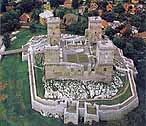 |
The
first castle erected on this hilltop was presumably a
motte and bailey castle built in the 12th century by the
Bors family. The Mongol invasion of 1241-2 resulted in
complete destruction of the castle, as well as the nearby
monastery and village. Following the withdrawl of the
Mongols, Hungarian King Bela IV decreed that every
hilltop should have a castle, and the prominent Ban Ernye
of the Akos Clan built the first stone castle on the site
as a private residence. It was oval in shape with a round
donjon and a polygonal outer wall. In 1319 the Eryne
family gave the castle to Dozsa Debreczeni, the Prince of
Transilvania, who passed it on to the Hungarian crown in
1340. In 1364 Ludwig of the House of Anjou (Louis the
Great) became King of Hungary and the status of
Diósgyőr rose dramatically. The town of Miskolc became
part of the estate and the castle itself was enlarged and
modified to its present size and shape. Ludwig I became
King of Poland in addition to Hungary, and the Treaty of
Turin compelling Venice to fly the Anjou flag was signed
at Diósgyőr in 1381.
|
 |
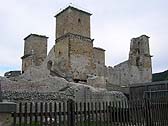 |
Diósgyőr
was now a mighty rectangular castle with a large square
tower at each corner. A 13 foot deep [4 meter] moat
surrounded the entire outer wall, which had a powerful
gatehouse set in 4 sides. Upon the death of Ludwig in
1382, the Kingdom of Hungary and Poland was split between
the King's daughters Mary and Jadwiga respectively, and
the castle lost some of its status. Between 1424 and 1526
the castle was the seat of six queens of Hungary, the
last Maria Habsburg, wife of Ludwig II. When the Ottoman
Turks conquered southern Hungary, Diósgyőr was further
fortified with the cannon rondell and other military
features added in 1564. It was to no avail - in 1596 the
Turks defeated the Christian army at Mezőkeresztes and
Diósgyőr fell into the hands of the invaders until 1687
when the Turkish rule ended. The castle gradually fell
into ruin until partial restoration was begun in 1953.
The castle houses a large museum, hosts numerous
festivals and in general is a popular symbol of Hungary's
long and colorful history.
|
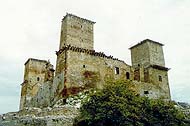 |
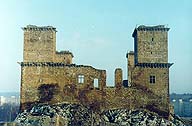
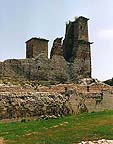
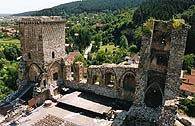

 |
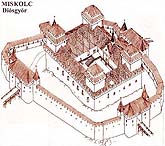 |
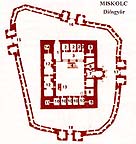 |
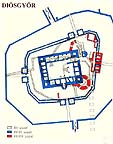 |
| Drawing of
the castle about 1370 |
Drawing of
the castle about
1560 before the cannon
rondell and other additions |
Castle
Plan about 1370 |
Castle
plan with moat
and 16th century
additions |
Construction
Photos of the Lego Model
Built March - May, 2007 (9 weeks)
I was not planning to count the bricks in
Diósgyőr, but it took such a huge amount of light gray
Lego that I needed to purchase some gray bricks for the
first time in several years. While the castle needed 21,000
light gray bricks and another 3,800 light gray plates (setting
a record), the entire castle was built with just (????)
34,352 pieces of Lego (royal family, minions and soldiers
and their weapons excluded). Vajdahunyad is still my
biggest castle! Romania #1, Hungary #2.
But GO Eastern European Castles!! |
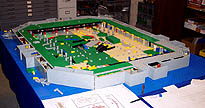 |
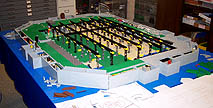 |
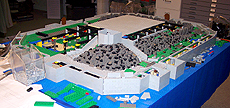 |
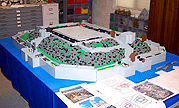 |
| Construction
progress March 8. |
Construction
progress March 25. |
The
hilltop begins to take shape and the
courtyard is ready on April 2 |
And on
April 6 the hilltop
construction is complete!
|
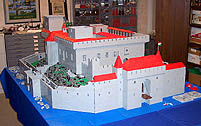 |
By April
17 the main castle has taken
shape and the final form of the outer
castle can be appreciated. |
Photos
of the Lego Model
Built March - May, 2007
|
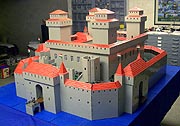 |
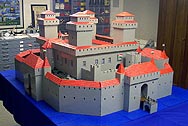 |
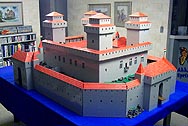 |
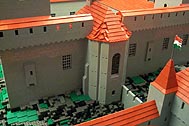 |
The NNW
view of the castle with
the D-shaped tower guarding the
main entrance (see below). |
I left the
late sixteenth century
cannon bastions off this mid-16th
century model! |
The back
of the castle reinforces
its symmetry and four very similar
outer gates. Was this bad planning? |
A closeup
of the chapel, garderobes
and many defences.
|
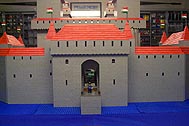 |
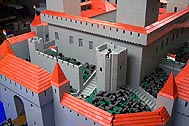 |
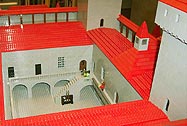 |
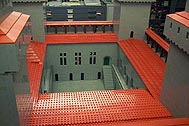 |
A typical
view of an outer
gatehouse - spiral stair at one
end only. |
The D-shaped
tower and nearby
curtain wall form a small middle
bailey. |
The north
portion of the inner
courtyard, entrance passage on
the left. |
Finally
finished on May 11, 2007,
here is the courtyard with the
great hall at the end and
storerooms below. |
Build
Your Own
|
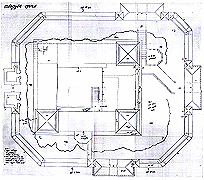 |
Lego Plan
|
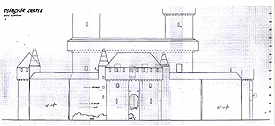 |
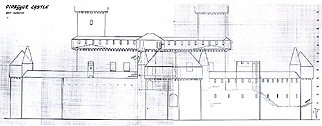 |
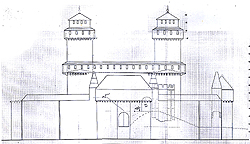 |
South
Elevation
|
East
Elevation
|
North
Elevation
|
Other Diósgyőr Castle pages:
http://www.burgenwelt.de/frameset.htm
click on Hungary, then Borsad-Abauj-Zemplen,
then Diosgyor
http://www.diosgyorivar.com/htm/tortenet_eng.htm
http://www.guide-to-castles-of-europe.com/diosgyor-castle.html
Return to the
main castle
page.
Castles created by
Robert
Carney
Page designed & maintained by Robert Carney




